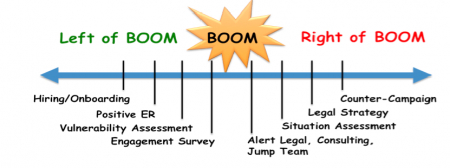Working In These Times
by Lindsay Beyerstein
The Labor Relations Institute helps keep workplaces 'left of boom"
Unionbusting is a multimillion dollar industry that has grown significantly since the 1970s. At least two-thirds of employers hire anti-union consultants to counter organizing drives.
According to economist John Logan, the unionbusting industry has evolved over the past few decades to focus on preventing organizing before it starts. Unionbusting is as old as unions. However, according to Logan, a new generation of consultants are "actively and aggressively creating that demand by encouraging management to fear the allegedly catastrophic consequences of unionization."
The Oklahoma-based Labor Relations Institute has taken fear-based marketing to new heights. LRI was reportedly hired to defeat an Industrial Workers of the World organizing drive at ten Jimmy John's sandwich shops in Minneapolis. One LRI white paper entiled "Left of Boom" likens union organizers to IED-planting Iraqi insurgents
The 2010 paper, available for free on LRI's website, argues that preventing unionization is a lot like defeating an insurgency. The report drives the point home with a photo of a military vehicle engulfed in flames. In Iraq, so-called "Left of Boom" (LOB) tactics are aimed at preventing insurgents from setting IEDs by identifying and disrupting the networks of influence that link bomb-makers to bomb setters.
"The military monitors, arrests, interrogates, and then turns over any members of the network to the Iraqi or Afghani governments for criminal prosecution," the paper explains. So-called Right of Boom" (ROB) tactics are steps taken to respond to an IED attack after it occurs.
The high-pressure marketing message is that your company should hire LRItoday to stamp out the slightest murmur of labor unrest. If you wait for the "boom"—the union organizing drive—it may already be too late, according to the paper. LRI claims that the very survival of your company may hinge upon keeping the union out. The paper asserts that organizing campaigns are often harmful to the physical and emotional health of workers and may even spark violence.
So, what's a terrified boss to do? Luckily, LRI is here to help. The first step is systematic surveillance and data gathering. The Institute's LOB tactics include surveys and structured interviews to identify dissatisfied employees and map out networks of influence within the workplace. ROB tactics include various "pushback" strategies to counter an organizing campaign in progress.
According to yet another white paper, employees can be scientifically "segmented" into one of five "buckets," which correspond to one of five smily faces, depending on how positively they feel about the company. LRI claims that segmenting the workforce is a key step in preventing labor unrest.
As part of its suite of LOB services, LRI offers two kinds of unionbusting training for managers and supervisors: active interval training, and trip wire training.
"The active interval training is designed to teach supervisors how not to be a jerk," according to the paper. It's a self-paced online course.
Trip Wire training purportedly teaches supervisors to recognize "the often subtle behavioral signs of union organizing" so that they can trigger a "silent alarm button," according to another white paper on the LRI website entitled "Is There a Target on My Back?":
Here’s an example. Suppose a union meeting occurs one night, run according to typical organizer playbook. They are asked to do various things by the organizer – they are often told to keep things quiet and are encouraged to assume the worst about their management team. The employees who attended will behave differently the next day. If supervisors are properly trained to pay attention when “something doesn’t feel right” about how employees are behaving, we have created the tripwire.
The white paper doesn't specify what those subtle signs are. It's probably very expensive to find out.
If you want to get really far out on the left edge of the spectrum, you can hire a "fake union organizer" aka "Mystery Shopper" from LRI to attempt to infiltrate your company and identify vulnerabilities. The fake union organizer will contact your employees by phone and in the workplace and report back to you.
"The Shopper may also talk to people in the community – at bars or stores near the facility – to see what people say about the company, just like a union organizer would (the consultant is careful never to ask an employee what they think about unions)," according to the white paper. The faux organizer will gague how easy it is for an outsider to infiltrate the employee parking lot and the break room. The fake union organizer will even "determine how easy it is to get into the dumpsters, and what they might find in the trash that they could use in an organizing campaign."

No comments:
Post a Comment